Matt Walsh Triggers Jeremy “TheQuartering” Hambly With Christian Teaching About Moderation And Discipline In Regards To Video Games

Daily Wire host Matt Walsh recently triggered YouTube personality Jeremy Hambly aka The Quartering after he shared pretty basic Christian teachings on moderation and discipline in regards to video games.

Walsh tweeted back in March 8, 2018, “Video games are a sacred cow because our country is filled with adults who are obsessed with them. That’s why we all pretend, insanely, that there’s nothing wrong with or disturbing about a child spending all day killing people in a virtual world.”
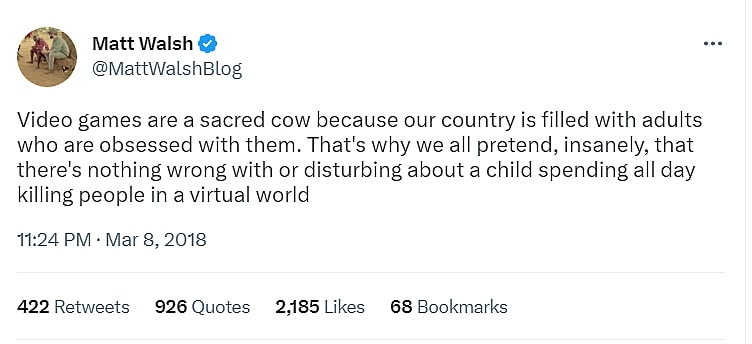
Back in October Walsh also was asked in an All Access Q&A session what his thoughts on anime were.
He answered, “I think it’s all satanic. I have no argument for why it is satanic, it just seems that way to me. All anime to me seems weird. Just bizarre. Creepy. And, in general, I don’t think that adults whether it’s anime or any other kind of cartoon. With rare exception adults should not be watching cartoons in general, I would say.”
Daily Wire host on anime: “I think it’s all Satanic. I have no argument for it — I have no argument for why it’s Satanic, it just seems that way to me” pic.twitter.com/LTNCluYeDR
— Jason Campbell (@JasonSCampbell) October 17, 2022
Walsh would later make it clear he was making an off the cuff joke about anime while satirizing Media Matters and the other outlets who ran his remarks as serious.
He noted, “These are all things that you might say if you believe that I was not being totally serious when I declared all animation made in Japan satanic. But, again, I am serious. If I was joking I would laugh. Deadpan humor has never been my thing, as you well know.”
“And that is why in the end, with all that said, anime is still cancelled. And cast back down into the fiery hell flames from whence it came,” he deadpanned.
Hambly took issue with Walsh’s opinions writing on Twitter, “The right’s weird obsession with disavowing video games, anime, & social media is why they will never appeal to most of Gen Z. The base is literally dying off and most of the voices in the community are actively refusing recruits.”
He then made it clear he was discussing Walsh writing, “Matt’s not the only guy saying it, there was some other moron who tweeted ‘anime is for pedophiles’ or something the other day.”
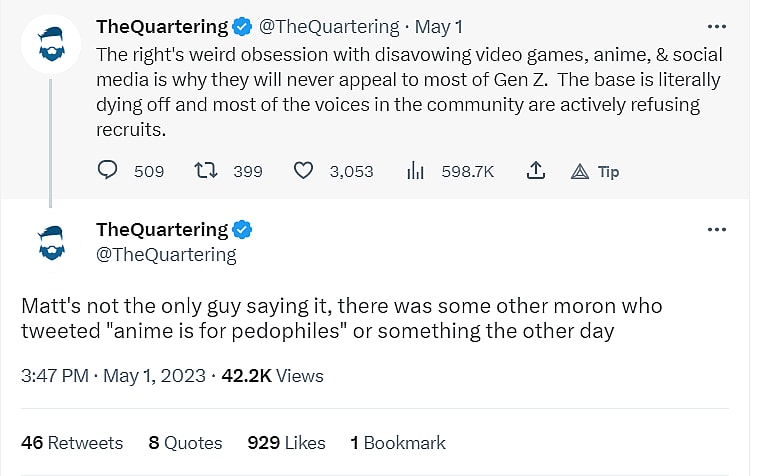
Walsh would respond to Hambly’s criticism where he further detailed his position on video games.
Walsh said, “There are few points that matter, I think, but you won’t be able to hear them if you insist absolutely that no statements even vaguely critical of video games can ever be uttered in your presence. If video games are a religion for you then there’s not much I can say to get through to you.”
“But for everybody else here’s what it boils down to,” Walsh continued. “There’s obviously nothing inherently wrong with video games as a medium. It’s just another form of screen-based entertainment.
Walsh went on to point out, “The two things we have to take into consideration with screen-based entertainment of all kinds are 1) the messages embedded in the content and 2) the amount of time spent on the content.”
While explaining how powerful screens are at messaging to people and influencing them, Walsh points out, “Go to any school and you’ll find a building full of kids whose values, beliefs, priorities, tastes have been nearly completely determined by the content they spend their days ingesting through the screen. Video games are not the only example of this or even the most potent example. But they also, obviously, aren’t an exception.”
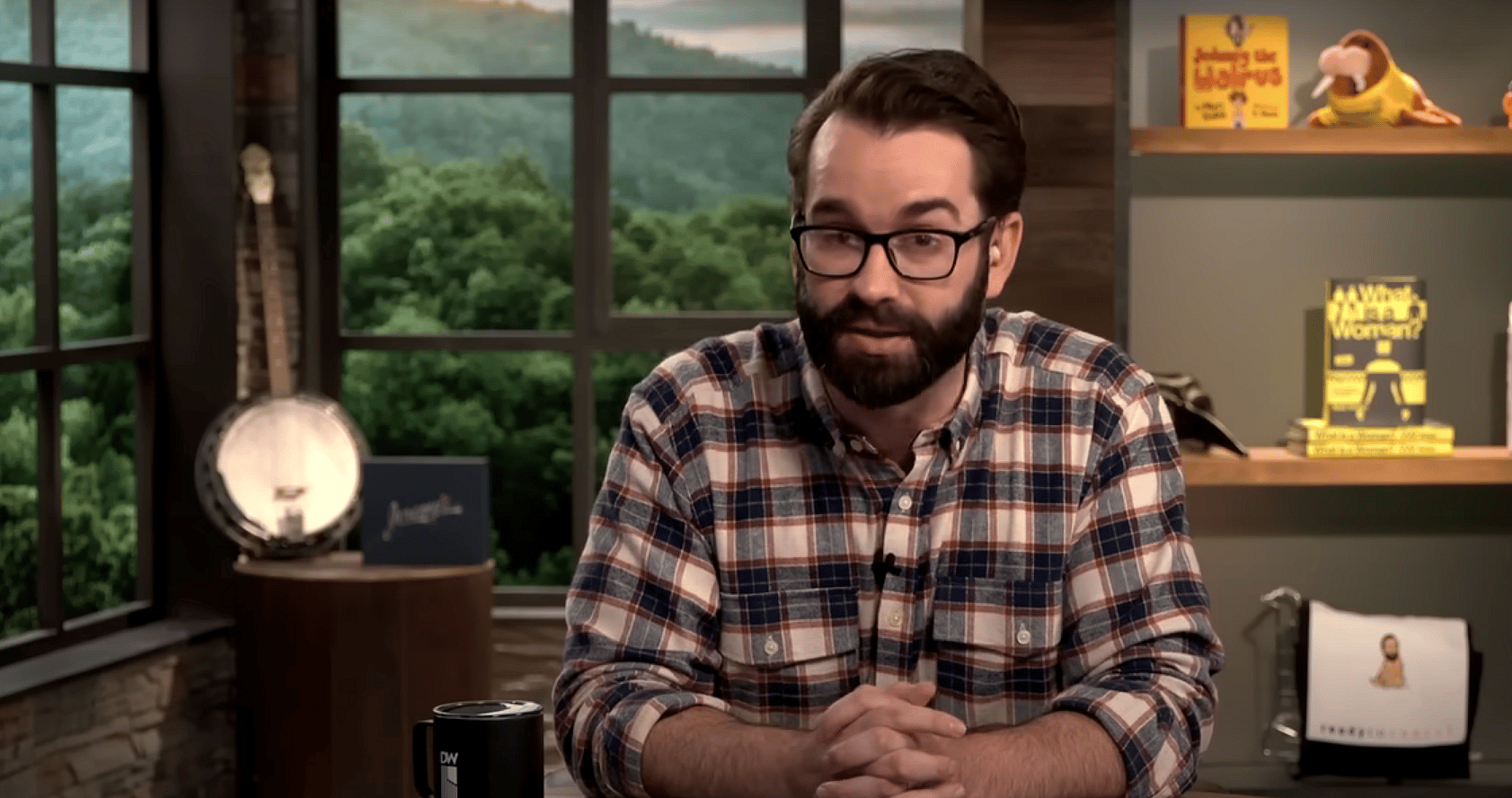
Walsh isn’t the only one to make this argument. The Walt Disney Company CEOs Bob Chapek and Bob Iger have also made this argument. In response to a Florida bill, that is now law, banning the teaching of gender identity and sexual orientation to students in kindergarten through third grade, Chapek informed Disney employees they would work around the bill through the content they create.
He said, “Because this struggle is much bigger than any one bill in any one state, I believe the best way for our company to bring about lasting change is through the inspiring content we produce, the welcoming culture we create, and the diverse community organizations we support.”
“There’s a reason content is at the top of this list. For nearly a century, our company’s stories have opened minds, inspired dreams, shown the world both as it is and how we wish it could be, and now more than ever before, represent the incredible diversity of our society. We are telling important stories, raising voices, and I believe, changing hearts and minds,” he added.
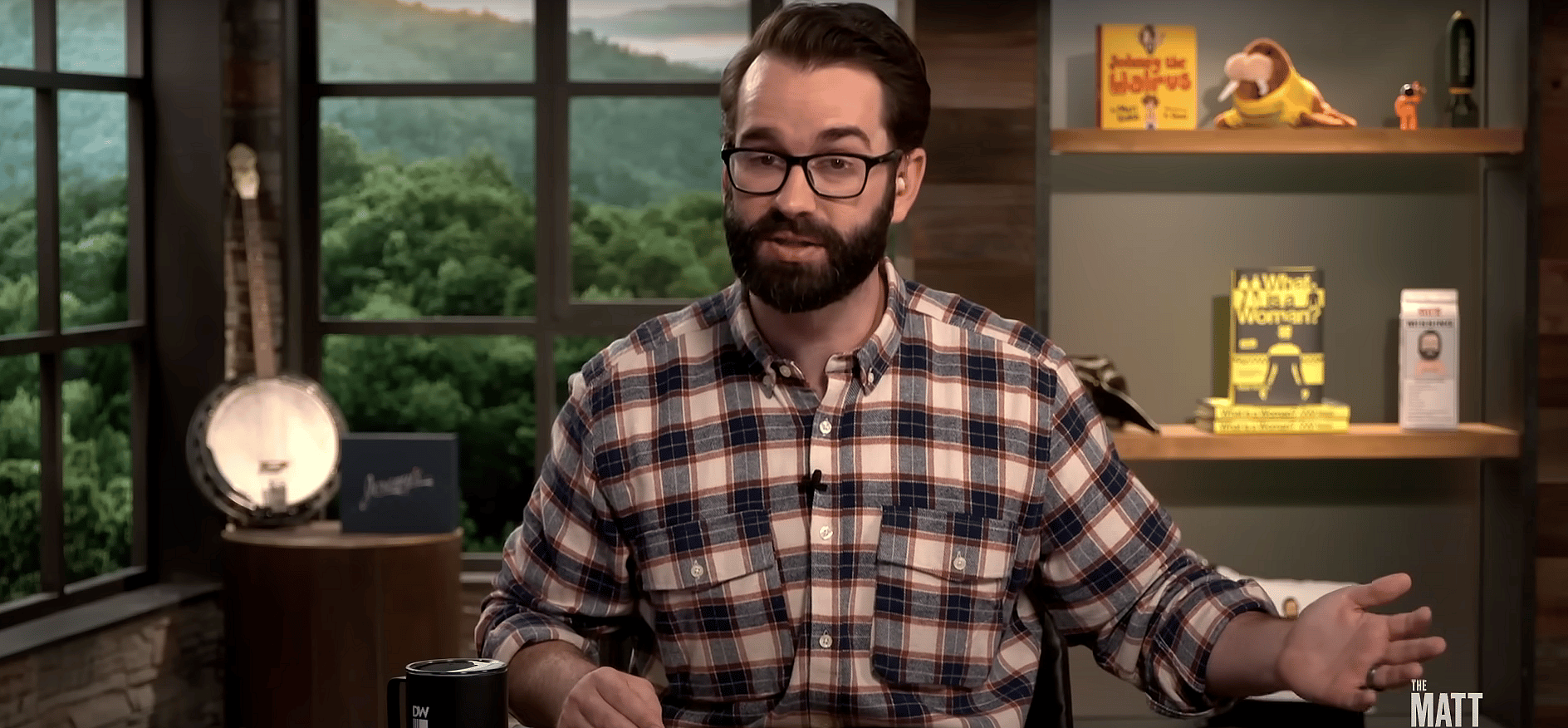
He later noted, “I firmly believe that our ability to tell such stories-and have them received with open eyes, ears, and hearts -would be diminished if our company were to become a political football in any debate.”
“Powerful content that changes hearts and minds only springs from inclusive cultures, which not only attract and retain the best and most diverse talent, but also give those employees the freedom to bring forth ideas that reflect their lives and experiences. We must work together to ensure Disney always remains such a place,” Chapek asserted.
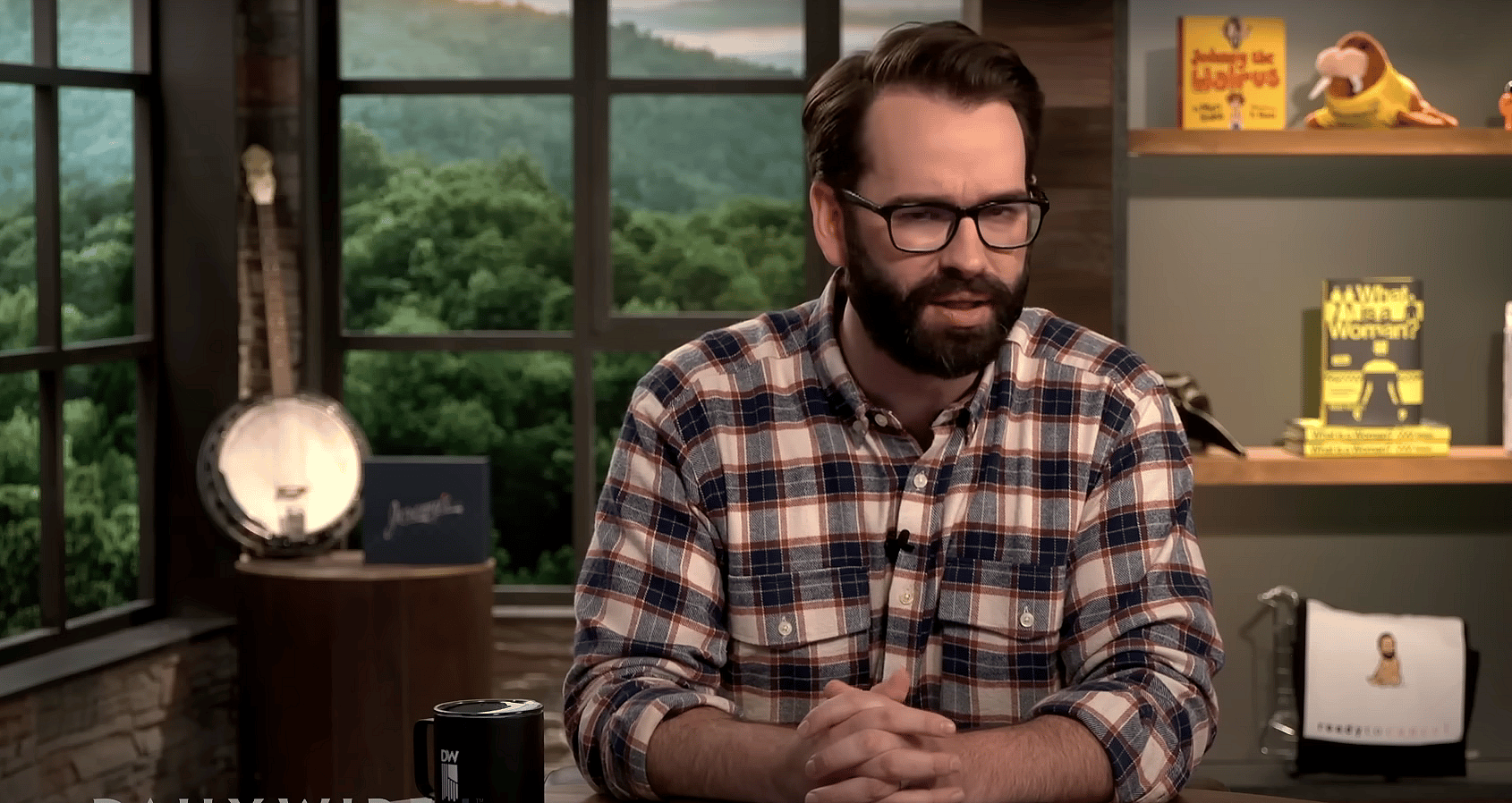
Bob Iger would echo these comments when he returned to the role of CEO. When asked about the Florida law, Iger told Disney employees, “This company has been telling stories for a hundred years, and those stories have had a meaningful, positive impact on the world. And one of the reasons that they’ve had a meaningful, positive impact is one of our core values is inclusion, acceptance, and tolerance. And we can’t lose that. We just can’t lose that.”
In response to the so-called “Don’t Say Gay” legislation, Iger said Disney would still promote “inclusion,” but suggested that the company must strike a “delicate balance” and “listen to [its] audience” and “have respect for the people that [it’s] serving.” This is a retreat. pic.twitter.com/bZBnQdm616
— Christopher F. Rufo ⚔️ (@realchrisrufo) November 29, 2022
Walsh would go on to criticize certain violent video games that he believes are desensitizing people to violence. He doesn’t name any games, but he points out that its games whose violence “is gratuitous, and amoral, and overly graphic. When it is violence for the sake of violence. When it’s violence where the entertainment comes from simply watching someone suffer even if in a fictional context.”
Walsh notes this type of violence “undermines human dignity and desensitizes the view especially if the view is a child.”
However, he notes that there are good forms of violence, what he calls heroic violence, that is done in the defense of the innocent or done by just superheroes.

Walsh would then go on to elaborate on his second point noting people and especially kids are spending an exorbitant amount of time playing video games. He claims, “They aren’t having real childhood experiences. They aren’t learning how to relate to each other and to the world. They’re becoming fat and depressed. They can barely even like speak to each other. They can’t look you in they eye. They don’t stand up straight.”
He goes on to explain, “It’s because the screen is a tyrant. It demands obsessive attention and it usually gets what it demands. There’s an undeniable addictive quality to all this stuff and most of us know that from experience.”
“It’s possible to moderate your own usage. It’s possible to moderate your child’s usage of the device. It’s possible to moderate the kind of content they’re exposed to on these devices. But the vast majority of parents fail to impose that kind of moderation,” Walsh notes.

Walsh’s commentary is not unheard of and is in line with the Catechism of the Catholic Church that teaches, “The means of social communication (especially the mass media) can give rise to a certain passivity among users, making them less than vigilant consumers of what is said or shown. Users should practice moderation and discipline in their approach to the mass media. They will want to form enlightened and correct consciences the more easily to resist unwholesome influences.”
Pope John Paul II also addressed the role of cinema in 1995, but it can also be applied to other mediums such as video games. He said, “As happens with all the media of social communication, the cinema, as well as having the power and the great merit of contributing to the cultural and human growth of the individual, can oppress freedom—particularly of the most weak—when it distorts the truth and when it presents itself as the mirror of negative types of behavior, using scenes of violence and sex offensive to human dignity and “tending to excite violent emotions to stimulate the attention” of the viewer.
He continued, “The attitude of those who irresponsibly bring about degrading imitative behavior whose harmful effects can be read about each day in the pages of the newspapers cannot be defined as free artistic expression. As the Gospel reminds us, only in the Truth are we made free.”

This commentary from Walsh that is clearly align with Christian teaching trigged Hambly who immediately lied that he did not mention Walsh.
Hambly wrote, “WILD take Matt. I am NOT conservative, nor have I ever claimed to be ‘recruiting’ for them. Comparing our ‘numbers’ is weird. You were not mentioned in this tweet, it was about ‘the right’ that’s why I didn’t say ‘Matt Walsh.’ Seems kind of sensitive & pointless infighting.”
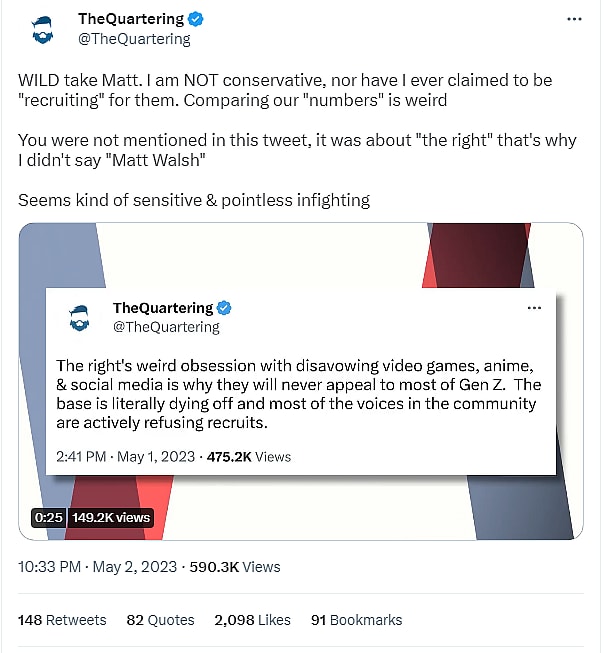
As shown above Hambly did indeed refer to Walsh in a subsequent tweet immediately following this one.
Nevertheless, he went on, “I am not interested in infighting but I am allowed to respond to this nonsense. Best of luck Matt. Daily Wire is doing great things nobody is questioning that but this feels like a stretch.”
Catching himself in his own lie, he then corrected, “okay it’s fair to point out it’s not TECHINCALLY ‘infighting’ but we do fight for about 85% of the same things… In-adjacent fighting?”
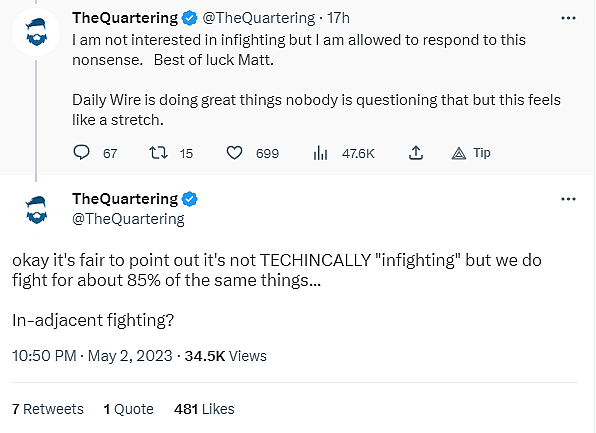
Hambly would double down on his lie even when confronted by Walsh, who tweeted, “Come on man. Stand by your words. You tweeted that at the exact moment that people were digging up old tweets of mine about video games. Everyone knows who you were talking about.”
Hambly retorted, “Matt, You’re wrong and still deflecting. Why are you so sensitive? My point was about the right not understanding culture and dismissing things like video games and anime to their own detrament. If you took that personal that’s more of a you issue bud. ;)”
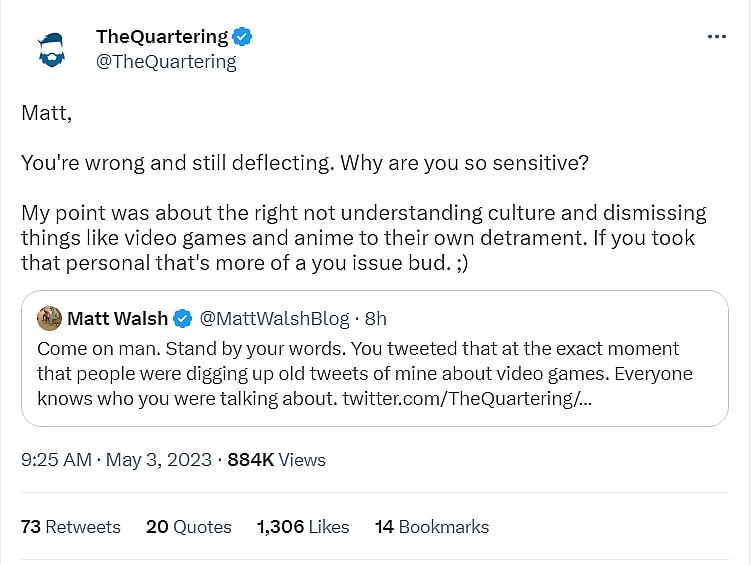
Hambly continued to double down on his lie when Walsh confronted him again, “You mentioned me by name. I know your whole gig is to start drama with people with bigger platforms but I really think you should consider generating content another way. Or at least if you’re going to stay on this strategy stop with the passive aggressive stuff. It’s lame.”
Hambly replied, “Matt, I did NOT mention you. I was CLARIFYING to people who thought it was you that It was in fact NOT. There you go relying on ‘numbers’ again to try and win an argument. If you want to play that game I suggest revealing how much DW pays to promote your content per month.”
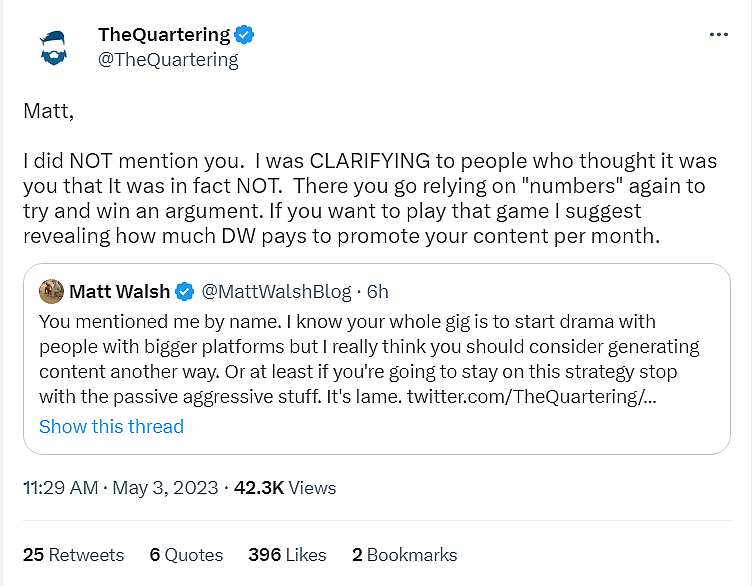
Hambly would then share DMs he sent to Walsh back in March about a completely unrelated topic in order to try and defend himself from accusations of clout chasing.
He tweeted, “I am not playing with this ‘take it to the dm’s’ crap & people claiming I am clout chasing. I do just fine. Second of all, I TRIED TO. Over 2 months ago. Zero replies. Hate to break it to you. Matt Walsh is the one doing this in public for clout. Not me. Go whine to him about being a ‘drama queen.'”
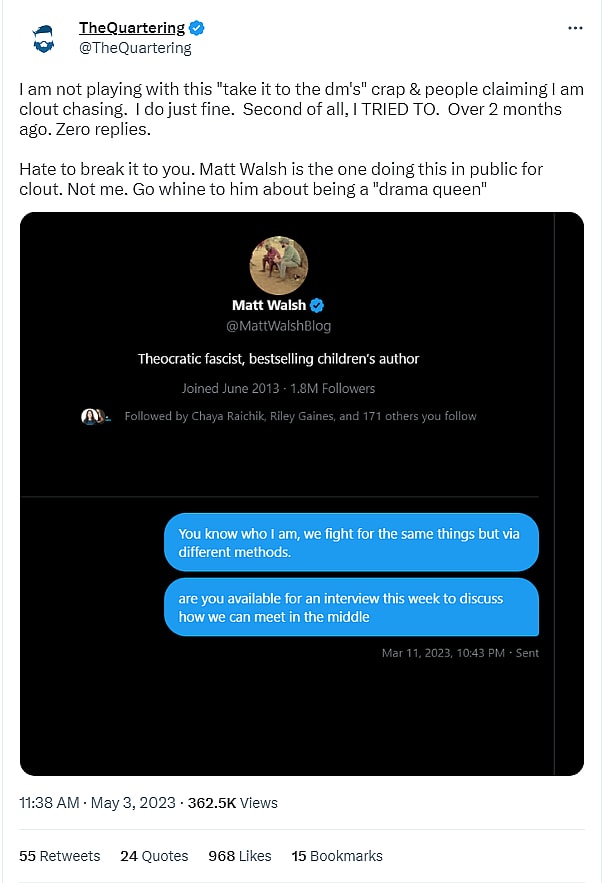
Next, he tweeted, “I love how Matt gets to shit stir and be a drama queen all he wants, make videos from some high horse and act all offended about a tweet that wasn’t even about him and nobody says he’s being a drama queen. My replies however are full of people telling me to let it go but not him.”
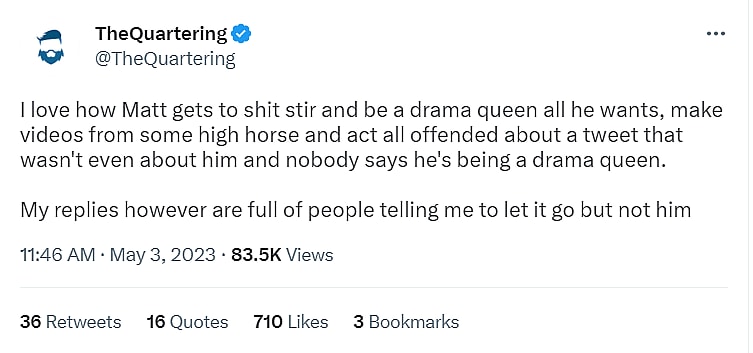
After previously taking issue with Walsh touting the number of people he’s brought into conservatism, Hambly tweeted, “I hope to change conservatives with HUGE platforms minds about culture like video games and anime. To dismiss it, or in many cases demonize it is to actively reject millions of potential republican voters who might not see themselves as ‘conservative.'”
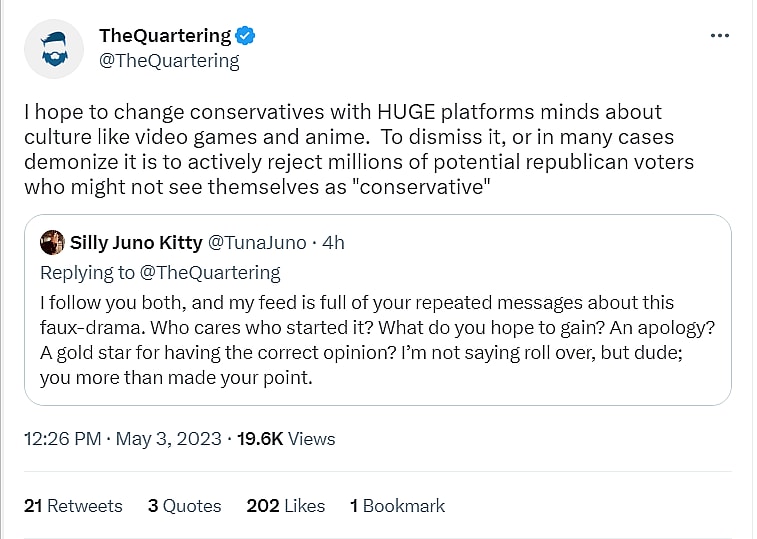
He would continue to attack Walsh by lying about his position on video games and that he believes playing them causes real world violence.
Hambly tweeted, “Now it all makes sense. Matt is literally a “violent video games cause real world violence” guy. HAHAHAHAHA this has been debunked a zillion times.”
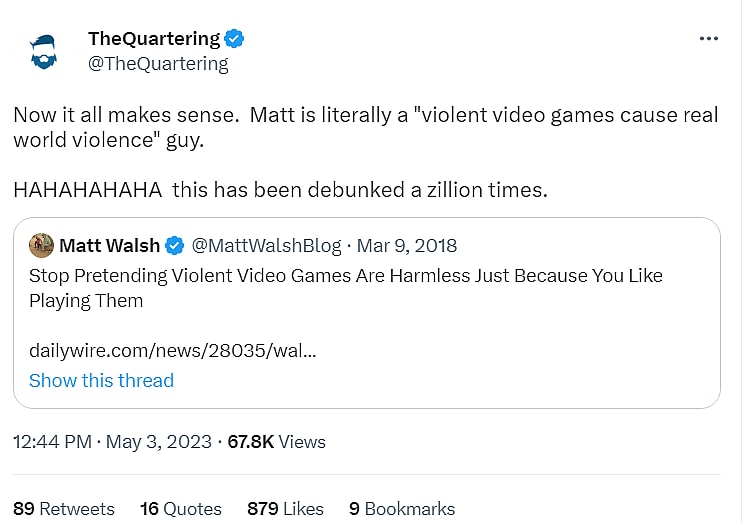
However, Walsh’s actual argument from the article that Hambly took issue with does not claim that at all. Instead, Walsh writes, “We all know it’s pretend. We all know the images are digital. We know you are not a serial killer. But the fact remains that you still enjoy pretending to kill people. Your favorite recreational activity is to pretend that you are killing people. You probably will never kill a single person in real life, but it’s still not good; it’s still unhealthy; it’s still pretty disturbing that you find so much joy in simulated death and destruction.”
He continues, “I say the same thing about people who love bleak, graphic, torture porn movies. A healthy, well-adjusted, morally aware person would find no enjoyment whatsoever in those films. Not because he thinks they’re real, but simply because he has no interest in entering a fantasy world filled with blood and death.”
After sharing a personal experience about the film Hostel, Walsh further detailed, “That’s one of the major effects the violent video games and movies certainly do have on a person: they feed the twisted part of his brain that delights in ugliness. We all have that in us, to some extent, in one form or another. But we should not indulge the instinct. We should not embrace it and fuel it. We bring ourselves into dark places when we do. Even if the dark place does not involve shooting up a school, it is still a dark place, and it is better to be in the light.”
He would also point to desensitization, “A person should be horrified by brutality and violence. We should be sickened by it. We should not take pleasure in it, and neither should we be neutral toward it. It’s clear that a lot of kids today — a lot of people, generally — have a certain numbness, a certain emptiness, inside of them. They do not recoil at evil. They do not feel disgust at disgusting things. This is at least partly because they spend so much of their time in a disgusting virtual world, pretending to do disgusting things for fun.”

Clearly, still triggered by Walsh, Hambly then took issue with another of his articles regarding Yoga, an opinion which is also in line with Christian teaching.
Hambly tweeted, “Boycott Yoga Christians lest you stretch and bend yourself into an eternity in hell!”

Hambly would also upload a video where he would continue to double down on his lie that he wasn’t talking about Walsh.
He attempted to explain his tweet directly referencing Walsh saying, “Was I talking about Matt? No. In fact the following tweet was in response to all the people in replies saying are you talking about Matt Walsh. And I said, ‘Matt’s not the only guy saying it, there was some other moron who tweeted ‘anime is for pedophiles’ or something the other day.” So this thread was absolutely not about Matt Walsh.”
Except, it literally was about Matt Walsh, given he referenced him by name and then noted it reflected Walsh’s views.
As expected Hambly would also double down throughout the video on everything he previously tweeted.
Walsh’s criticisms of video games are nuanced and there is some merit to them. We should not become slaves to our hobbies. They should be hobbies.
His arguments about violence are also valid, but again there’s also nuance to it. There’s a difference between logging in to a game and taking joy in the violence and death and competing against other people, solving problems, enjoying a well-told story, and the numerous other benefits that video games can and do offer. These nuances are something that Hambly does not engage with at all. Rather, he resorts to lying and “gotcha” moments on Twitter.
Indeed, Hambly’s tweets seemingly don’t even care about Walsh’s actual arguments about video games. In fact, his last criticism is not even about video games at all, but is about the Christian warning of practicing Yoga, a pagan ritual. And that appears to be where Hambly’s true ire with Walsh is, his Christianity.
https://youtu.be/SknNkH46hjw
What do you make of Hambly getting triggered about Matt Walsh and his opinions on video games?
